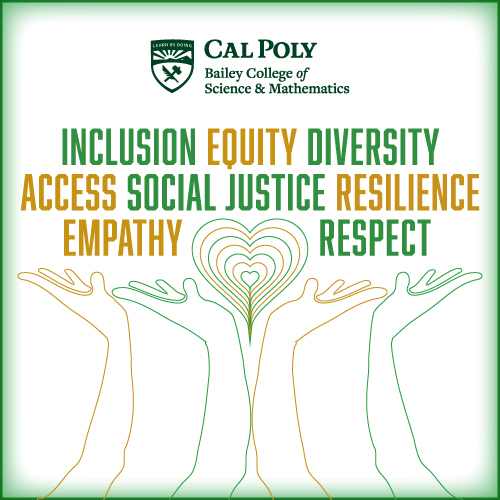
About Us
Climate change is the biggest problem humanity has ever faced, and it will be the defining challenge for the next generation.
To meet this challenge, ICLR is building the Institute for Climate Leadership and Resilience, an organization that will train the next generation of climate leaders for these emergent careers, increase regional resilience on the Central Coast, and make Cal Poly a recognized climate leader in higher education. Cal Poly’s contribution is crucial, and so is yours:

ICLR exists to facilitate collaboration among donors, industry partners, different campus departments, and our global community to create a future workforce that can produce climate solutions. The foundational skills to lead the necessary work of developing climate resilience are teachable, and our students are uniquely qualified with the ability and passion to lead the way.
Resilience is built through human adaptation to climate change and we provide interdisciplinary, hands-on, Learn by Doing educational experiences focused specifically on responding to climate change.
Cal Poly’s robust portfolio of high-impact research centers and firmly established brand of top-tier polytechnic education uniquely position it to provide leadership in developing applied climate solutions and to train the climate professionals of tomorrow.
Cal Poly has many highly-regarded faculty experts working on climate policy and socio-economic impacts, sustainable technologies, climate-smart agriculture and alternative energy, locally and around the world. Cal Poly offers an ideal location due to (i) agricultural, fishery and ecological diversity within many microclimates, (ii) abundant open space, (iii) a diverse socio-economic demographic, (iv) forward-thinking local government, (v) an environmentally-engaged populace, and (vi) proximity to major metropolitan areas in spite of an essentially rural character.
Funding
- College Corps 24-26. $11.5M, 672 fellows.
- UC-RGPO Climate Seed Program 23-25. $1.75M to support SLI.
- SEI Energize Colleges. 2 research interns from March to July 2023.
- College Corps 24-26. $10.6M, 630 fellows.
- Central Coast Community Energy 21. $25,000.
In the News
- Feature: Cal Poly’s partnership with Zero Foodprint could help SLO County’s farmers and regenerative agriculture practices (July 2025, New Times San Luis Obispo)
- SLO County ordered another study of potential offshore wind port sites. Where could it be? (September 2024, San Luis Obispo Tribune)
- Campus-Community Partnership Helps California Farms Adapt to Climate Change (August 2024, Cal Poly News)
- Cal Poly ICLR to host third annual ‘Climate Solutions Now’ Conference (October 2023, Mustang News)
- Cal Poly Receives $1.9 Million for Climate Action Initiatives as Part of $80 Million State Funding Plan (September 2023, University Communications and Marketing)
- Cal poly wants to help SLO County farmers deal with climate change (September 2023, New Times SLO)
- Cal Poly takes on Climate Action: Broad Initiative Seeks Solutions Towards Environment Sustainability (March 2023, Bailey College of Science and Mathematics)
- Cal Poly faculty participate in annual ‘Climate Solutions Now’ conference (December 2022, Mustang News)
- Here’s what the Inflation Reduction Act could mean for SLO County (August 2022, San Luis Obispo Tribune)
- In a coastal California town, three iconic smokestacks are coming down. A community mourns (August 2022, LA Times)
- Cal Poly SLO students to get paid for community service (July 2022, San Luis Obispo Tribune)
- Ecology Action Engaging with Local College Students through College Corps (May 2022, Ecology Action)
- Cal Poly to implement inaugural #CaliforniansForAll College Corps Program (February 2022, San Luis Obispo Chamber of Commerce)
- Our Climate Future: Earth Edition (2022, Cal Poly Magazine)
- Cal Poly’s Climate Solutions Now Conference a Success (November 2021, Ecologistics)
- Initiative for Climate Leadership and Resilience to host inaugural event this weekend (October 2021, Mustang News)
- Climate Leadership Can Be Learned (2021, Intersections Magazine)
Activities
Service Learning Projects
ICLR coordinates with local jurisdictions to identify projects with components that fit well into existing courses, following the EPIC model. This allows city, county, or other entities to leverage no-cost student work to complete local climate change and sustainability projects, and provides a rich learning experience for the student while producing valuable deliverables for the client entity.
Projects may include:
- Outreach and education for electrification of buildings
- Outreach and education for incentive programs for energy reduction
- Development of EV Readiness Strategy
- Climate action planning and resilience planning activities
- Environmental justice and vulnerability assessments

Example Service Learning Projects
Significant opportunities exist for potential repurposing uses of the Phillips 66 Santa Maria Oil Refinery, according to preliminary analysis conducted by ICLR and commissioned by the Central Coast Economic Recovery Initiative (ERI). The analysis was produced by two separate student-led projects at Cal Poly, and explored a half dozen different repurposing uses for the Phillips 66 facility that is slated for closure in 2023. Potential reuses analyzed for the site include desalination, green hydrogen generation, grid-scale battery storage, plastics recycling, an anaerobic digester for organic waste, and conservation. Read the full story at cceri.org.
- Sustainable Land Initiative
- BRAE Equipment Development
- LAES Website Creation
- GRC Educational Material Design
- Community Choice Agencies
- Rooftop Solar Incentivization
- EV Incentivization
- Repurposing Phillips 66
- Conceptual Desalination Environmental Constraints Analysis
- Conceptual Multipurpose Site Redevelopment Analysis
- Optimal Offset Calculator
- Resilient Energy Assessment (REA)
- ResilientSLO
- Innovative Carbon Sequestration
Curriculum Development
ICLR supports faculty developing new curricula related to climate change and sustainability, or adapting existing courses to include a project-based service learning component.
Example courses:
- NR 310 - Global Climate Change. This junior-level Natural Resources Management course is a general education course open to all majors and covers global climate systems, methods of inference used in climate science, how global warming affects the human and natural world, and policy impacts.
- BIO 470 - Biology of Climate Change. Biological consequences of climate change at different levels of biological organization and various environments. Atmospheric chemistry, global and regional climate dynamics and history, consequences for human populations. Possible mitigation actions and their contribution to CO2 emission reduction.
ICLR is also working with the Academic Senate Sustainability Committee to develop and revise the campus-wide Sustainability Learning Objectives (SLOs) for courses. These objectives help identify courses that are sustainability-focused or sustainability-related, and courses that meet 2+ of the 4 SLOs are subsequently added to the Sustainability Catalog (SusCat), a resource designed to help students find sustainability courses on campus.
Finally, ICLR is working with the Sustainability Office and Department of Natural Resources and Environmental Sciences to produce a Sustainability Literacy Assessment. This is Cal Poly’s third assessment of this kind. Since 2023, this version has been deployed in classes across campus as a 15-minute survey to test students’ sustainability literacy and values, and to attempt to determine whether Cal Poly’s curriculum is adequately fostering sustainability literacy. Over 900 students have been surveyed between 2023-2024. Read about the initial analysis here.

Professional Development
ICLR offers workshops and courses through Extended Education that promote sustainable practices and allow professionals to pivot towards sustainable pursuits within their chosen career.
Courses include:
- Carbon Farm Planning. For farmers and agribusiness professionals to learn about low-carbon and regenerative farming techniques and implementation. This course is offered through cooperation with the CAFES Center for Sustainability.
- High-Performance Buildings. For HVAC professionals to learn about automated control systems and new electric alternatives to gas appliances (heat pumps, thermal energy systems, etc).
- LCA Literacy. For city staffers and managers of industrial operations to learn about Life-Cycle Analysis (LCA) data; how to interpret it and how to incorporate it in the decision-making process.
- Climate Action Planning. For city staffers and elected officials to learn about the process of developing a community plan for decarbonizing at a municipal level.

Events
ICLR helps host a variety of climate and sustainability events on campus in the community. Events center education and engagement.
Events include:
- Climate Solutions Now from 2/3-2/7/25. Our fourth annual conference boasted 75 talks and discussions in 13 parallel tracks, such as Energy and Environmental Justice, and brought together over 1100 attendees.
- TCTAC webinar on 10/30/24. This webinar centered two of the EPA’s 16 centers in the Environmental Justice Thriving Communities Technical Assistance Center (EJ TCTAC) Program, the WEST EJ Center and SDSU’s CCEEJ. The two speakers shared information about each center’s services with technical assistance when applying for environmental justice grant opportunities in different EPA regions. Watch the recording. (This event was co-hosted by the SLO County Climate Justice Alliance.)
- “Cooked: Survival by Zip Code” screenings on 9/22/24 at the Palm Theatre and on 10/20/24 at Cal Poly. From award-winning filmmaker Judith Helfand, “Cooked” reveals the ways in which class, race, and zip code predetermine unequal response and recovery to environmental disaster. By linking the deadly Chicago heat wave of 1995 to the underlying manmade disaster of structural racism, Helfand's film delves deep into one of our nation's biggest growth industries: Disaster Preparedness. (This event was co-hosted by the SLO County Climate Justice Alliance.)
- Bringing Beavers Back to Coastal California on 5/18/24 at Cal Poly. This hybrid educational event centered the major role beavers can play in improving and maintaining ecosystem health if they are able to return to coastal watersheds in California. It featured presentations from experts in the field, interactive discussions, and tours of local beaver habitat the following day. (This event was co-hosted by SLO Beaver Brigade and Morro Bay Open Space Alliance.)
- Watch the recording of Cooper Lienhart’s talk on “Process-Based Restoration: mimicking beavers to restore stream health”. Cooper is the President of Nature’s Engineers.
- Watch the recording of Kate Lundquist and Brock Dolman’s talk on “Lessons Learned and Replicable Strategies for Connecting with and Bringing Beavers Back in California”. Kate and Brock are the Co-Directors of the Occidental Arts and Ecology Center WATER Institute.
- Watch the recording of Steph Wald’s talk on “Creek Lands Conservation- Protecting and Conserving Small Coastal Watersheds of the Central Coast”. Steph Wald is the Watershed Projects Manager at Creek Lands Conservation.
- Climate Solutions Now from 10/25-10/27/23. Our third annual conference boasted 75 talks and discussions in 12 parallel tracks, such as Climate Communications and Forest Carbon, and brought together 821 attendees.
- Climate Solutions Now from 10/26-10/28/22. Our second annual conference boasted 65 talks and discussions in 12 parallel tracks, such as Built Environment and Sustainable Aviation.


Climate Solutions Now
The annual ICLR fundraising conference connects faculty, government employees, industry professionals, entrepreneurs, and students, to showcase current and future solutions to climate and sustainability challenges.

Proud member of the SLO County Climate Justice Alliance



